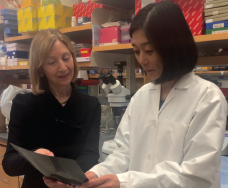
Dr. Gravallese and Yukiko Maeda, PhD, instructor in medicine in the Gravallese laboratory, review data.
Robert Finberg, MD, chair of medicine at the University of Massachusetts (UMass) in Worcester, describes Ellen M. Gravallese, MD, as one of a dying breed: a quadruple-threat physician who excels in basic science research, clinical care, teaching and administration. Dr. Gravallese holds the Myles J. McDonough Chair in Rheumatology, is professor of medicine and serves as chief of the Division of Rheumatology at UMass Medical School. She began her exemplary career as an undergraduate in biochemistry at Harvard College, at which time she planned to concentrate on basic science research. An interest in understanding the mechanisms underlying disease and a desire to do work “that was clinically relevant and that, with luck, would help change the course of a disease” led her to medicine.
Below, Dr. Gravallese, who will serve as ACR president beginning in 2019, reflects on some of the important mentors and junctures in her career as a preeminent researcher in rheumatology and immunology.
Dr. Gravallese’s research opportunities included working as an undergraduate with mentor Guido Guidotti, PhD, Higgins Professor of Biochemistry, with whom she investigated red cell membrane proteins. She identified a red cell membrane anion channel during work on her senior honors thesis, work that caught the attention of H. Franklin Bunn, MD, the researcher at Brigham & Women’s Hospital who identified hemoglobin A1c as a glycosylated protein in diabetes. Dr. Bunn hired Dr. Gravallese to explore red cell membrane proteins to determine whether they, too, were glycosylated in diabetic patients. In collaboration with a hematology fellow, John Miller, MD, she published her first article in the Journal of Clinical Investigation as a medical student at Columbia University College of Physicians and Surgeons. Other important mentors would follow.
Routes to Rheumatology
As a medical student at Columbia, Dr. Gravallese developed a fascination with rheumatic diseases. Much of that fascination was thanks to Gary Hoffman, MD, her mentor during a rotation at Mary Imogene Bassett Hospital. Dr. Hoffman made major contributions to the field of vasculitis after joining the Vasculitis and Related Diseases Section at the National Institutes of Health, and is currently professor emeritus at the Center for Vasculitis Care and Research at the Cleveland Clinic.
Dr. Gravallese then began her internship in internal medicine at Brigham & Women’s Hospital in Boston. She had thought ultimately to combine anatomic pathology with basic science research, but patient contact in medicine, she realized, supplied a critical missing link. Her Pathology Department chair, the late Ramzi S. Cotran, PhD, the F.B. Mallory Professor of Pathology at Harvard, suggested a solution for combining her dual career interests. Renowned not just as a molecular scientist but also as an intuitive mentor, Dr. Cotran developed a joint residency in pathology and medicine for her, and at the end of that residency she became a diplomate in both specialties.
